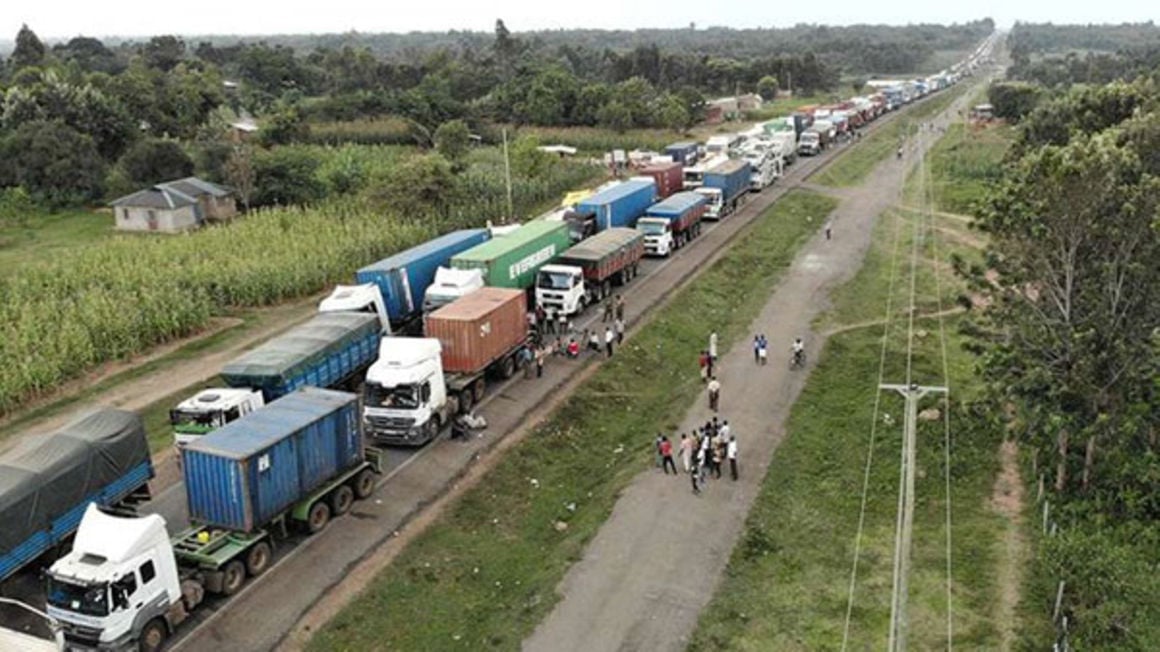Kampala-Mombasa most expensive route in EAC cargo transportation

Costly transportation of goods distorts trade competitiveness, according to the Shippers Council of East Africa . Photo | Edgar R Batte
What you need to know:
The Kampala-Mombasa route costs transporters Shs9,690.55 ($2.5) per tonne, which is way above the international best practices of $1 per kilometre per container
A survey on logistics performance in East Africa has found that the Kampala-Mombasa route is the most expensive in the region, which distorts trade competitiveness.
The survey, conducted by Shippers Council of East Africa found, that the Kampala-Mombasa route costs Shs9,690.55 ($2.5) per tonne, which makes it the most expensive in East Africa.
It is followed by the Mombasa-Kampala route, which costs Shs8,411.39 ($2.17), while Dar es Salaam-Kampala costs Shs4,535.17 ($1.17) per tonne.
The Bujumbura-Dar es Salaam route costs Shs3,953.74 ($1.02) per tonne.
The survey also noted that transporters that use the Northern Corridor bear some of the highest costs in the world, reflecting how shortage of alternative routes is impeding trade competitiveness in East Africa.
Transport costs in the region are estimated at an average of $1.8 per kilometre for every container against international best practices of $1 per kilometre per container.
The survey also found that the least expensive routes were Dar es Salaam-Bujumbura, which costs Shs77.52 ($0.02) per tonne, followed by Dar es Salaam-Kigali at Shs658.95 ($0.17) and Nairobi-Dodoma at Shs387.6 ($0.1) per tonne.
The Northern Corridor road network covers 12,707 kilometres, of which 1,323.6 kilometre are in Kenya while 2,072 kilometres are in Uganda.
Rwanda has 1,039.4 kilometres, 567 kilometre in Burundi, 4,162 kilometres in DRC and 3,543 kilometres in South Sudan. The port of Mombasa is a key entry and exit point for cargo from a vast hinterland that includes Uganda Burundi, DR Congo, Kenya, Rwanda and South Sudan. The port also serves Tanzania, Somalia and Ethiopia.
The report summarises average transport cost per metric tonne, assuming a payload of 24 metric tonnes per 40-foot container.
Speaking during a webinar by the East African Business Council and TradeMark East Africa, Mr Merian Sebunya, the National Logistics Platform in Uganda chairman, appealed to governments in the region to bring down the cost of transport and logistics to ensure that EAC exports compete at international level.
“Transport and logistics costs comprise of 35 to 42 percent of production. This is high compared to 8 percent in Asian countries. This has negatively impacted the competitiveness of the EAC bloc and trade balance,” he said.
The main drivers of freight cost include fuel prices, non-tariff barriers, long timeliness of clearance at the port and slow turnaround time.
The report shows that Uganda and Kenya had the highest number of police stops for trucks standing at between six and nine while Tanzania had between three and five.
Rwanda had the least police stops at between zero and two.
Uganda had six to nine weighbridge stops while Kenya had three to five. Rwanda and Tanzania had the least weighbridge stops at between none and two.
“Nearly 66 percent of East African cargo uses the Northern Corridor. The improvement of infrastructure, automation and interconnectivity is set to reduce transport costs along this corridor,” said Mr Emmanuel Imaniranzi from the Northern Corridor Transit and Transport Agreement.
He also noted that cargo throughput at the Port of Mombasa had increased since last year while transit time on the Northern Corridor was recovering following easing of Covid-19 restrictions and use of digital certificates, although transportation costs were still high.
Uganda government prepares Plan B in case of any eventuality from Kenya election
Government has said that whereas it expects the Kenyan elections this week to end peacefully, it is preparing for any eventuality.
Speaking last week, Mr Henry Okello Oryem, the Foreign Affairs state minister in charge of International Affairs, said that he hopes the elections will end peacefully but noted that government was preparing for any eventuality including stocking up supplies and rerouting shipments through Tanzania.
Whereas there has been no evidence to suggest that the Tuesday (August 9) election outcomes could disrupt operations on the Northern Corridor, the violence in the 2007 elections, which stretched into 2008, caught Uganda unaware, causing a crisis that presented serious shocks to the economy.
However, while addressing the 22nd Ordinary Summit of the East African Community Heads of State in Arusha, Tanzania last month President Uhuru Kenyatta, said nothing would go wrong.
The 2007/08 violence caused an acute scarcity of fuel in Uganda, which transports its petroleum products through the Northern Corridor from Mombasa port.
Data from Uganda Bureau of Statistics indicates that at least five million litres of fuel are consumed in Uganda every day.
Kampala City Traders Association said last week that it expects at least 4,000 transit cargo containers during the election week through Mombasa, whose safe passage will depend on how the polls turn out.
“Diverting cargo to other ports can only be done at the port of origin. We had already instructed shipping lines to deliver cargo at Mombasa,” said Mr Jemba Kanakulya Mulondo, a Kacita board member in charge of security and environment.
“That’s why we are asking for security. Kenya should provide armed escorts for goods destined for Uganda during the voting week,” he added.
The 2007/8 post-election violence in Kenya disrupted the Northern Corridor operations leading to huge losses for Ugandan and Rwandan businesses, many of which are yet to be compensated.
Mr Mulondo said that despite courts ordering Kenya to pay Ugandan traders $47m in compensation, noting has ever been paid.
Data from Kenya Ports Authority indicates that Uganda is the biggest user of Mombasa port, accounting for 85 percent of its transit cargo.
“KPA collects handling charges of $700 per 40ft container and $600 for 20ft transit cargo after nine days. This should be waived,” he added.




